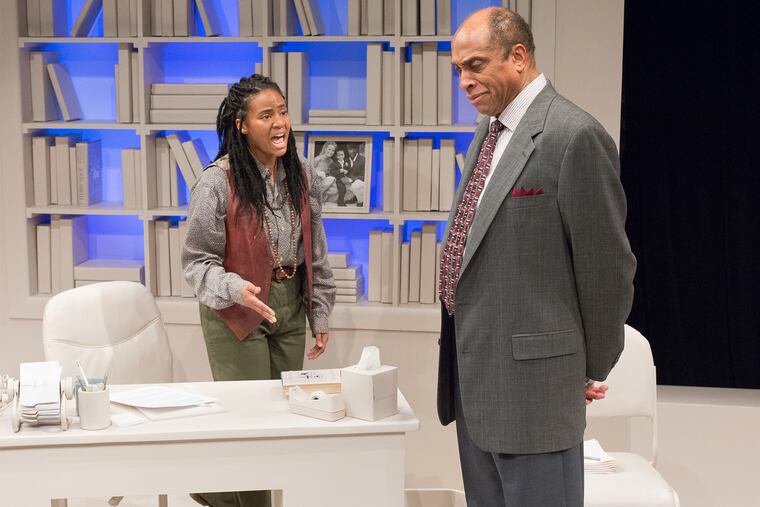‘Oleanna’ at Independence Studio on 3: Mamet’s somewhat outmoded play, still with moments of power
Our national conversation about male-female power relations -- and their abuses -- have moved on from 1992, when this play debuted. Yet, thanks to good performances and strong staging, this production has a few almost redemptive moments of connection and power.

Carol, a struggling college student, is baffled and obtuse at first, then inexplicably aggressive and arrogant. John, her professor, may just be trying to help — first her, then himself. But he’s cursed with a tin ear, a condescending attitude, and an unfortunate tendency to invade his student’s personal space.
John’s conversations on an intermittently ringing phone suggest he has other pressing concerns: a new house he may lose, a tenure decision in doubt, a wife who seems to need constant reassurance. In three acts and just 75 minutes, Carol will morph from insecure dilettante to harpy feminist, representing an unnamed group whose complaints against John may cost him his livelihood.
Neither the professor nor the student in David Mamet’s 1992 play Oleanna — about power reversals, shifting perspectives, gender, roles, and academic freedom — is particularly likable, or even believable. The revival at the Walnut Street Theatre’s Independence Studio on 3, directed by Debi Marcucci, makes us recoil from both characters, and the caricatures they represent.
Written in the aftermath of the 1991 Anita Hill-Clarence Thomas hearings, when sexual harassment was entering the country’s lexicon, Oleanna is something of a cop-out. It injects a note of postmodernist uncertainty into interactions that are often, if not always, relatively clear-cut. After all, Hill didn’t misunderstand her boss Clarence Thomas’ alleged fixations on both pornography and dating her. Either Hill lied or Thomas was way out of line.
Still, one can understand the temptation to revive Oleanna. The recent controversy over Supreme Court nominee Brett Kavanaugh, the larger #MeToo movement, and the swelling ranks of women in politics all seem like echoes of that earlier time.
It’s also fair to say that men and women continue to see these issues differently: Men fret about being penalized for office flirting while women report far more egregious abuses of power. We still, sometimes, talk past each other, just as Mamet’s characters do.
Marcucci has added another layer of complexity to Oleanna (whose title is an ironic reference to a 19th-century Pennsylvania utopian community) by casting two fine African American actors, Jessica Johnson and Johnnie Hobbs Jr. Johnson brings a fierce intensity to Carol (though making her transformation credible would tax even Meryl Streep), and Hobbs combines a commanding physical presence with a tendency to sputter in frustration.
Roman Tatarowicz’s white set, a slightly abstracted professor’s office, includes a provocative photograph of John with his white wife. Jimmy Lawlor’s lighting bathes the intrusive phone in an otherworldly glow, and Rebecca Dwight’s costumes show John becoming slovenly in shirtsleeves while an increasingly assertive Carol ends up in a dark pantsuit and heels.
It’s tempting to say that Oleanna, which I first saw in the original Mamet-directed production with William H. Macy and Rebecca Pidgeon, hasn’t aged well. Perhaps it was never a very good play to begin with. But it does have one brilliant, manipulative moment that almost redeems it: the instant in which audience members, male and female alike, find themselves uncomfortably implicated in John’s rage.